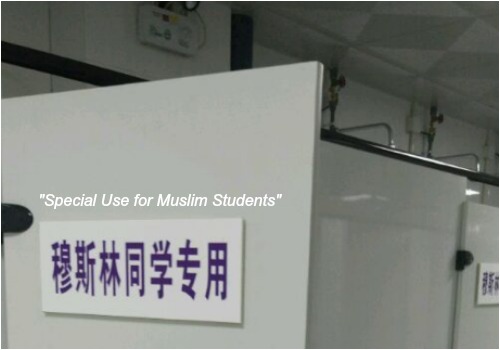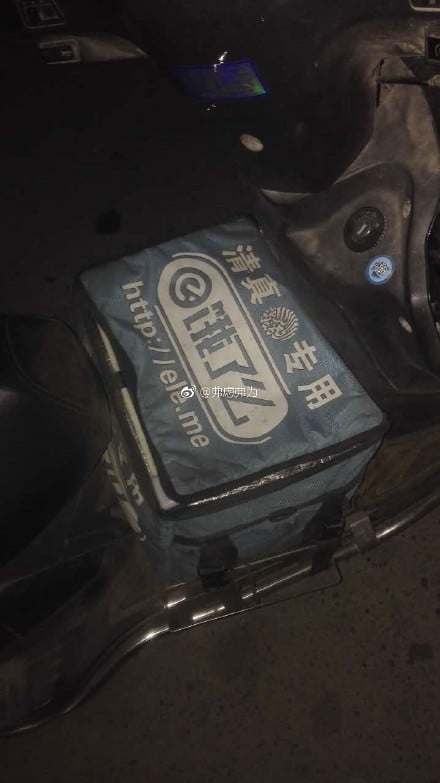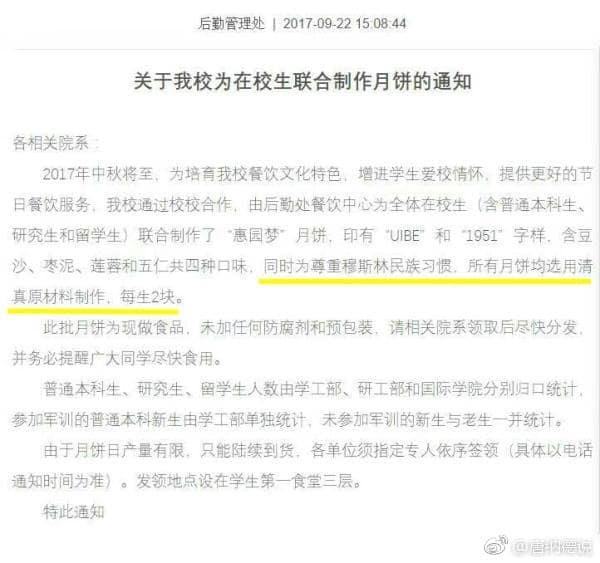Posts containing terms such as “green religion” and “peaceful religion,” or any other online terms relating to Islam or Muslims invented by Chinese netizens, are currently banned from Chinese social media.
Chinese state media outlet Global Times reports that the ban comes amid an online backlash against national policies which some deem “overly favorable to Muslim minorities.”
Anti-Islamic Sentiments on Weibo
Anti-Islamic sentiments have been on the rise on Weibo over recent years, and often peak when people disagree with alleged “affirmative discrimination policies” toward Chinese Muslim minorities. China has an estimated 23 million Muslims.
One such incident occurred in 2016, when a Chinese university introduced separate shower cabins for Muslim students that offered complete privacy, while the ordinary dorm showers are usually open.

The case triggered anger online, especially among students, of whom some wrote: “I also have the f**cking rule that nobody should see me shower, am I going to have an exclusive shower cabin now?”
In July, online reports about the introduction of ‘Halal Only’ food delivery boxes also evoked anger as it sparked discussions about the ‘halalifaction‘ of food in China.

A very recent incident involved a case where a girl was harassed by a Muslim man on the Bund in Shanghai. When her online report was taken offline, and police did not give out any background details about the suspect, Weibo users complained that religious sensitivities were placed above personal safety.
Another incident took place in Tangshan in early September, where an alleged altercation took place between Muslim minorities and local staff at a toll station. Online rumors about the incident triggered a wave of anti-Islam comments, and videos of the incident were soon after deleted from Chinese social media.
“The Green Religion”
On Chinese social media, Islam is often referred to as the “peaceful religion” (和平教) or the “green religion” (绿教). While the first is mostly meant sarcastically, the second comes from the importance of the color green in Islam and is meant to refer to the religion in a negative way.
In the same type of derisive, derogatory online speak, Muslims are often referred to as “the greens” (绿绿) on Weibo. ‘Greenification’ (绿化) is another online word, meaning ‘Islamization.’
At the time of writing, abovementioned online terms such as “green religion” or “peaceful religion” were all banned from Weibo’s search function and showed no results.

In its recent article, Global Times quoted a Beijing professor in saying that “it is necessary to timely remove radical phrases that discriminate against Islam and are biased against Muslims to prevent worsening online hatred towards the group” and that these online terms “severely undermine religious harmony and ethnic unity.”
In a Global Times column earlier this week, editor Shan Renpin conveyed a similar message in saying that there “might be negative consequences” to the government’s “protection of the harmony with minority groups and religions,” but that “overall, if the authorities would not do it this way, the other negative consequences are likely to be more serious.” (“这样做确实有时会有负面效果,但是综合起来看,如果官方不这样做,另外的负面效果很可能更大.”)
Ongoing discussions: Halal Mooncake
Despite the recent ban on certain terms, Chinese netizens still find ways to discuss Islam-related controversies. On Friday, another topic triggered heated discussions regarding halal mooncakes.
With the Chinese national Mid-Autumn Festival (中秋节) holiday nearing, many people discussed how a Chinese university stated that all of their mooncakes (the traditional snack for this festival) will be halal in consideration for their Muslim students.
Beijing’s University Of International Business And Economics (对外贸易经济大学) issued a notice on September 22 (see below) regarding the mooncakes, saying “to respect the traditions of our Muslim students, all our mooncakes will be made from halal ingredients.”

The issue attracted hundreds of comments, with many saying: “Don’t these schools know that Muslims don’t even celebrate Mid-Autumn Festival?”
“Respect the Muslims – for this minority, we all have to eat halal.”
“Since when did the Chinese Mid-Autumn Festival become a Muslim festival?”
Although much of the anger in this discussion is directed more so at the school’s organization (“Why does 99% of the people have to adapt for the 1%?”) than at its Muslim students, it does also include much hate speech towards Muslims in general.
One thing the latest controversy shows is that despite the fact that these discussions are now more heavily censored, their tone and terms are the same as before.
Although Global Times asserts that China’s “favorable policies” are intended to maintain ‘social harmony’ and accelerate ‘greater ethnic unity,’ most netizens commenting on these issues do not seem to be on the same page. Typical comments said: “How can they say we’re harming national unity by talking about Muslims?” and “I just don’t understand [..]. When did religion become a minority? Can a religion represent minorities?”
By Manya Koetse
Follow @whatsonweibo
Spotted a mistake or want to add something? Please let us know in comments below or email us.
©2017 Whatsonweibo. All rights reserved. Do not reproduce our content without permission – you can contact us at info@whatsonweibo.com.
The post No More Online Anti-Islam Terms Allowed on Weibo – but Discussions Continue Anyway appeared first on What's on Weibo.